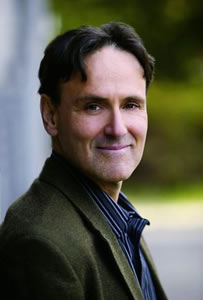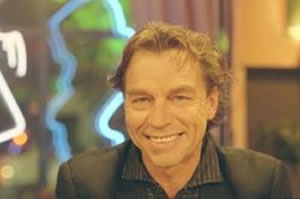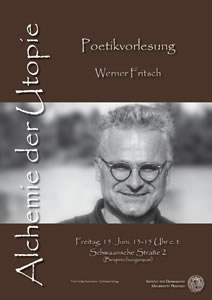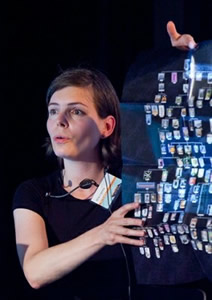De Amerikaanse dichter en schrijver David Guterson werd geboren op 4 mei 1956 in Seattle. Zie ook alle tags voor David Guterson op dit blog.
Uit: Snow Falling on Cedars
“Ishmael saw something else, too. On the far side of the car, with her own shovel in hand, Hatsue worked without looking up. She was digging through the snow to the black earth of the cedar woods and throwing spadefuls of it underneath the tires.
Fifteen minutes later the three of them walked down the road toward his DeSoto. The Willys station wagon’s rear right tire had been perforated by a fallen branch still wedged up under both axles. The rear length of exhaust pipe had been crushed, too. The car wasn’t going anywhere–Ishmael could see that–but it took Hisao some time to accept this truth. With his shovel he’d struggled defiantly, as if the tool could indeed change the car’s fate. After ten minutes of polite assistance Ishmael wondered aloud if his DeSoto wasn’t the answer and persisted in this vein for five minutes more before Hisao yielded to it as an unavoidable evil. He opened his car door, put in his shovel, and came out with a bag of groceries and a gallon of kerosene. Hatsue, for her part, went on with her digging, saying nothing and keeping to the far side of the car, and throwing black earth beneath the tires.
At last her father rounded the Willys and spoke to her once in Japanese. She stopped her work and came into the road then, and Ishmael was granted a good look at her. He had spoken to her only the morning before in the second-floor hallway of the Island County Courthouse, where she’d sat on a bench with her back to an arched window just outside the assessor’s office. Her hair had been woven then, as now, into a black knot against the nape of her neck. She’d told him four times to go away.”

David Guterson (Seattle, 4 mei 1956)
De Nederlandse columnist, schrijver, ex-voetballer, en televisiepersoonlijkheid Jan Mulder werd geboren in Bellingwolde op 4 mei 1945. Zie ook alle tags voor Jan Mulder op dit blog.
Uit: Doodstil
“Stilte is prettig en goed zonder zoektocht door de geest. Je dient het te ervaren, kort en krachtig, lang en mooi als je wilt, op momenten die je overvallen. Hem opzoeken om jezelf te vinden gaat over een dwaalspoor. Ik ben nog nooit iemand tegengekomen die zichzelf had gevonden en de vindplaats glashelder kon aanwijzen.’
(…)
‘De ene stilte is de andere niet, zelfs wanneer ze uit dezelfde categorie komen: de stilte in de middag en die van ’s nachts. De stilte is ondefinieerbaar en bedrieglijk. Een moment denk je dat de stilte van een cirkel groter is dan die van een vierkant en vijf minuten later komt de twijfel: een vierkant is ook wel cool.’
(…)
‘Nergens is de woede verschrikkelijker dan in de stilte van een volmaakt vredig landschap. Ik kom daar later in dit verslag op terug met een verklaring uit de hemel die zal worden voorgelezen door mijn advocaat, mits hij nog in leven is.’

Jan Mulder (Bellingwolde, 4 mei 1945)
De Duitse schrijver Werner Fritsch werd op 4 mei 1960 in Waldsassen geboren. Zie ook alle tags voor Werner Fritsch op dit blog.
Uit: Faust Sonnengesang. Ein Filmgedicht (Fragment)
„I. FARADAYKÄFIG DES JETZT
FAUST: STIMME: WERNER FRITSCH
Dies ist ein Film des Jetzt
Gott Stein Herz ich
Über die Himmel
Dieser Seele hin
Über die Abgründe
Faust ins Jetzt
Zu übersetzen aus Atem
Geht alles hervor
Im Wind steigt
Alles empor alles
Fiel der Gottheit
Fließendes Licht dein Blut Elias
Dein Gott Stein Herz
Ich auf die Welt herab
Schwarzes Loch aus Mord
Und Mode und doch
Unter milderem Himmel
Lebte ich wie durch
Ein Wunder als Kind
Und wohin der Geist
Mich zu gehen hieß
Dahin flog ich und was
Ich sein wollte floß
Im Rauschen des Baches fort
Gingen Blitze Gottes Augen
Aus mich überall zu begleiten
Im Bernstein im Gold
Im Schwarz deiner Pupillen
So sehe ich mich“

Werner Fritsch (Waldsassen 4, mei 1960)
Affiche voor een lezing
De Russische netkunstenares Olia Lialina werd geboren op 4 mei 1971 in Moskou. Zie ook alle tags voor Olia Lialina op dit blog.
Uit: Invisible and Very Busy
“Computers are getting invisible. They shrink and hide. They lurk under the skin and dissolve in the cloud. We observe the process like an eclipse of the sun, partly scared, partly overwhelmed. We divide into camps and fight about advantages and dangers of The Ubiquitous. But whatever side we take — we do acknowledge the significance of the moment.
With the disappearance of the computer, something else is silently becoming invisible as well — the User. Users are disappearing as both phenomena and term, and this development is either unnoticed or accepted as progress — an evolutionary step.
The notion of the Invisible User is pushed by influential user interface designers, specifically by Don Norman a guru of user friendly design and long time advocate of invisible computing. He can be actually called the father of Invisible Computing.
Those who study interaction design read his “Why Interfaces Don’t Work” published in 1990 in which he asked and answered his own question: “The real problem with the interface is that it is an interface”. What’s to be done? “We need to aid the task, not the interface to the task. The computer of the future should be invisible!”
It took almost two decades, but the future arrived around five years ago, when clicking mouse buttons ceased to be our main input method and touch and multi-touch technologies hinted at our new emancipation from hardware. The cosiness of iProducts, as well as breakthroughs in Augmented Reality (it got mobile), rise of wearables, maturing of all sorts of tracking (motion, face) and the advancement of projection technologies erased the visible border between input and output devices. These developments began to turn our interactions with computers into pre-computer actions or, as interface designers prefer to say, “natural” gestures and movements.”

Olia Lialina (Moskou, 4 mei 1971)
Zie voor nog meer schrijvers van de 4e mei ook mijn vorige blog van vandaag.
